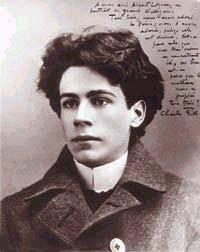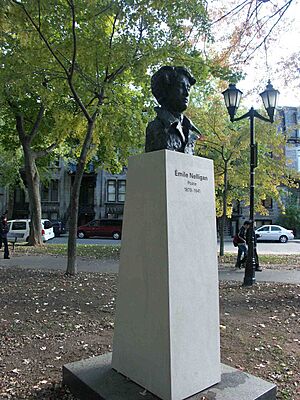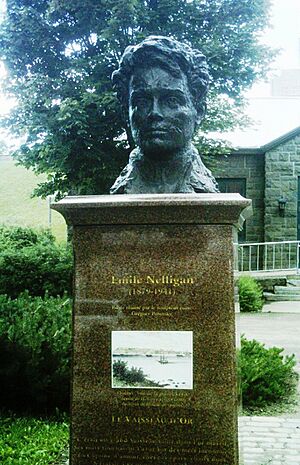Émile Nelligan facts for kids
Quick facts for kids
Émile Nelligan
|
|
|---|---|

Nelligan in 1899
|
|
| Born | 24 December 1879 |
| Died | 18 November 1941 (aged 61) |
| Occupation | Poet |
Émile Nelligan (born December 24, 1879 – died November 18, 1941) was a famous Canadian poet from Montreal. He wrote his poems in French. He is known for his unique style, called Symbolism.
Even though he stopped writing poetry when he was only 19 years old, Nelligan is still a very important figure in Quebec culture. Many people, including writer Edmund Wilson, thought he was the greatest Canadian poet of his time.
Contents
About Émile Nelligan
Émile Nelligan was born in Montreal on December 24, 1879. His father, David Nelligan, came to Quebec from Dublin, Ireland. His mother, Émilie Amanda Hudon, was from Rimouski, Quebec. Émile had two sisters, Béatrice and Gertrude.
Early Life and Poetry
Nelligan was a very talented poet from a young age. He followed a style called Symbolism. This style uses symbols and images to express ideas and feelings. His poetry was inspired by other famous poets like Charles Baudelaire and Edgar Allan Poe.
He started publishing his poems in Montreal when he was just 16 years old. He quickly became known for his amazing writing skills.
Later Life and Legacy
In 1899, when Nelligan was 19, he began to show signs of mental health challenges. His parents asked for him to be admitted to a mental hospital. There, he was diagnosed with a mental illness. After this, he did not write any more poetry.
In 1903, a collection of his poems was published. It was very popular in Canada. It is not known if Nelligan himself knew how famous his poems had become.
Émile Nelligan passed away in 1941 and was buried in the Cimetière Notre-Dame-des-Neiges in Montreal. After his death, people became even more interested in his work. His unfinished poems created a kind of romantic story around him. His poems were first translated into English in 1960. Later, in 1983, Fred Cogswell translated all his poems into English.
Nelligan is still seen as one of the greatest poets in French Canada. Many schools and libraries in Quebec are named after him. There is even a hotel in Old Montreal called Hotel Nelligan.
Some people have wondered if another person, Louis Dantin, actually wrote Nelligan's poems. However, experts from the University of Ottawa have studied the poems. They found that Nelligan was indeed the true author of his works.
Famous Poems
Émile Nelligan is remembered for many beautiful poems. Here are two of his most well-known works.
Le Vaisseau d'Or (The Ship of Gold)
This poem is one of Nelligan's most famous. It tells the story of a magnificent golden ship that sinks. Many people believe this ship represents Nelligan's own dreams and hopes.
Ce fut un grand Vaisseau taillé dans l'or massif:
Ses mâts touchaient l'azur, sur des mers inconnues;
La Cyprine d'amour, cheveux épars, chairs nues,
S'étalait à sa proue, au soleil excessif.
Mais il vint une nuit frapper le grand écueil
Dans l'Océan trompeur où chantait la Sirène,
Et le naufrage horrible inclina sa carène
Aux profondeurs du Gouffre, immuable cercueil.
Ce fut un Vaisseau d'Or, dont les flancs diaphanes
Révélaient des trésors que les marins profanes,
Dégoût, Haine et Névrose, entre eux ont disputés.
Que reste-t-il de lui dans sa tempête brève?
Qu'est devenu mon coeur, navire déserté?
Hélas! Il a sombré dans l'abîme du Rêve!
Here is an English translation of the poem:
A vessel of great might / Was hewn of solid gold / Masts billowed in the air / On seas beyond compare
There Venus came in sight / Bare-skinned with tousled hair / Spread upon the prow for sunlight to behold
But then came fateful night / A great reef sealed her doom / In the deceiving ocean / Wherein sirens sing
Her hull was tilted forth / The wreck slipped tapering / Down to the chasm's depths / Toward a silent tomb
A vessel hewn of gold / Diaphanous as air / Revealed its treasure hold / To vulgar sailors, there
Disgust and Hate and Fear / Amongst themselves did rage /
The vessel's gone amiss / In sudden storm it seems / What's happened to my heart, lost on the thankless waves? /
Alas! It sank into the dark abyss... of dreams
Christ en Croix (Christ on the Cross)
This poem shows Nelligan's deep thoughts and feelings about faith and suffering.
Je remarquais toujours ce grand Jésus de plâtre
Dressé comme un pardon au seuil du vieux couvent,
Échafaud solennel à geste noir, devant
Lequel je me courbais, saintement idolâtre.
Or, l'autre soir, à l'heure où le cri-cri folâtre,
Par les prés assombris, le regard bleu rêvant,
Récitant Eloa, les cheveux dans le vent,
Comme il sied à l'Éphèbe esthétique et bellâtre,
J'aperçus, adjoignant des débris de parois,
Un gigantesque amas de lourde vieille croix
Et de plâtre écroulé parmi les primevères;
Et je restai là, morne, avec les yeux pensifs,
Et j'entendais en moi des marteaux convulsifs
Renfoncer les clous noirs des intimes Calvaires!
Here is an English translation of the poem:
The gypsum Jesus always stalled me in my steps
Like a curse at the old convent door;
Crouching meekly, I bend to exalt an idol
Whose forgiveness I do not implore.
Not long ago, at the crickets' hour, I roamed dim
Meadows in a restful reverie
Reciting 'Eloa', with my hair worn by the wind
And no audience save for the trees.
But now, as I lie with knees bent beneath Christ's scaffold,
I see his crumbling mortar cross
With its plaster buried in the roses, and am saddened -
For if I listen close enough, I can almost hear
The sound of coal-black nails being wrung in
To his wrists, the savage piercing of Longinus' spear.
Tributes to Émile Nelligan
Many places in Quebec are named after Émile Nelligan, including schools and libraries. Since 1979, there has been an award called the Prix Émile-Nelligan. This award celebrates young poets in North America who write in French.
In 2005, a bust (a sculpture of his head and shoulders) was placed in Carré Saint-Louis in Montreal to honor him. There is also another monument dedicated to him in Quebec City.
Nelligan's poetry has also inspired many music composers. They have created songs and musical pieces based on his beautiful words. Some of these composers include André Gagnon, Gilbert Patenaude, and Jean Chatillon.
See also
 In Spanish: Émile Nelligan para niños
In Spanish: Émile Nelligan para niños
 | Audre Lorde |
 | John Berry Meachum |
 | Ferdinand Lee Barnett |



